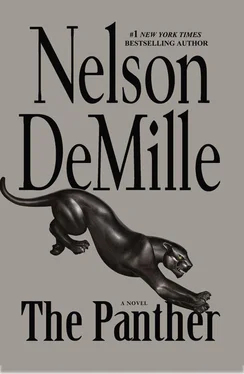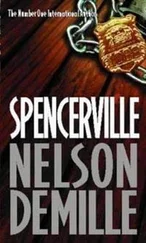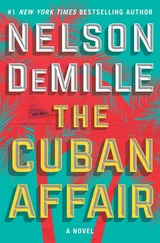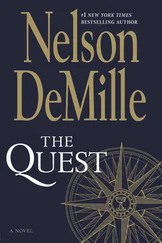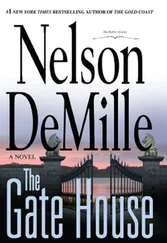Nelson Demille - The Panther
Здесь есть возможность читать онлайн «Nelson Demille - The Panther» весь текст электронной книги совершенно бесплатно (целиком полную версию без сокращений). В некоторых случаях можно слушать аудио, скачать через торрент в формате fb2 и присутствует краткое содержание. Жанр: Триллер, на английском языке. Описание произведения, (предисловие) а так же отзывы посетителей доступны на портале библиотеки ЛибКат.
- Название:The Panther
- Автор:
- Жанр:
- Год:неизвестен
- ISBN:нет данных
- Рейтинг книги:5 / 5. Голосов: 1
-
Избранное:Добавить в избранное
- Отзывы:
-
Ваша оценка:
- 100
- 1
- 2
- 3
- 4
- 5
The Panther: краткое содержание, описание и аннотация
Предлагаем к чтению аннотацию, описание, краткое содержание или предисловие (зависит от того, что написал сам автор книги «The Panther»). Если вы не нашли необходимую информацию о книге — напишите в комментариях, мы постараемся отыскать её.
The Panther — читать онлайн бесплатно полную книгу (весь текст) целиком
Ниже представлен текст книги, разбитый по страницам. Система сохранения места последней прочитанной страницы, позволяет с удобством читать онлайн бесплатно книгу «The Panther», без необходимости каждый раз заново искать на чём Вы остановились. Поставьте закладку, и сможете в любой момент перейти на страницу, на которой закончили чтение.
Интервал:
Закладка:
“When can I kick him in the balls?”
He ignored me and said, “I also have all this in Arabic-the warrant, the indictment, and his Miranda warning for him to read and sign.”
“Howard, is this a joke?”
“No, it is not. This arrest will be made lawfully and properly, and it will stand up in an American court of law.”
Well, if I had any second thoughts about whacking The Panther, Howard just put them all to rest.
I said to him, “Brief Kate on all this.”
“I will. But I want you, as one of the likely arresting agents, to understand this.”
“Okay.”
He assured me, “I’m just trying to keep you from making a mistake that could jeopardize a Federal prosecution, and get you or us in trouble.”
“Thank you.”
“That’s what I’m here for.”
“Right.” I actually liked Howard, and I could see that he was bright enough to learn how the world really worked. After a few months in this place, he’d lose his idealism and his fine legal scruples and he’d be helping the PSO torture suspects in Ghumdan Prison. Well, maybe not. But like all of us who’ve been on the front lines too long, and all of us who lived through 9/11, Howard Fensterman would become a little more like the people we were fighting. Of that, I was sure.
Buck came over to us, and instead of Howard asking him about the captured terrorist-sorry, the suspect-Howard asked him, “What time are you leaving tomorrow?”
Buck replied, “Before eight A.M.” He explained to Howard and to me, “It’s about four hundred kilometers to Aden, and it can take anywhere from four to six hours. So we want to get there in time for the convoy to turn around and get back to Sana’a not too long after dark.” He further explained to us, “We’d rather the DSS agents not stay overnight in Aden, because we need those resources here.”
I thought we might need them more at the Sheraton.
I again suggested to Howard, “Come along for the ride. If we get ambushed, you can tell us when we can legally return fire.”
Even Howard laughed at that.
Buck said to Howard, “We have room, and we can always use another gun. We gather in the chancery parking lot at seven.”
Howard acknowledged that and exited stage left.
Buck asked me, “Were you giving him a hard time?”
“Not me.”
“He’s doing his job,” Buck assured me. “Unfortunately his job makes our job more difficult.”
“Not for me.”
Buck changed the subject and said, “Paul told me you learned a few things at Ghumdan.”
“We did. Our allies are assholes.”
“Did you learn anything you didn’t already know?”
“Maybe.” I informed Buck, “Howard didn’t know we were at Ghumdan.”
“Is that so? Did you tell him?”
“No. I told him to see you.”
“I’ll speak to him.” He added, “We’re not sure how the legat fits into this.”
“Let me know when you know.”
“I will.” He asked me, “What did you speak to Colonel Kent about?”
“The Yemeni Army.”
He let that go and asked, “What did you learn at Ghumdan?”
I never liked it when an NYPD boss wanted to debrief me without my partner present. There could be a misunderstanding. So I replied, “I think Paul wanted the four of us to discuss that.”
“Of course.” He asked me, “So how did you like Ghumdan?”
“It has a way to go to become a model penal institution.”
“I thought so, too.”
I asked him, “Were you there this morning?”
“No, but I’ve been there many times in the past.”
“When will we see the CIA report on their interrogation of the prisoner?”
“After it’s been seen by the station chief.”
I had not yet been introduced to the CIA station chief in Yemen, so I asked, “And who is that?”
“You don’t need to know.” Buck added, “And he doesn’t need to know you.”
I asked, “How many games are in town?”
“Several. But ours is the main game at the moment.” He added, “You ask good questions.”
That’s not what he meant, but I said, “Thank you.”
“Paul said Colonel Hakim was his charming self.”
“He was obstructing American justice.”
“That’s his job.”
I told him, “The fact is, if we had two or three hours alone with the prisoner, with an embassy interpreter, we’d know a lot more about Al Qaeda in Yemen than we do now.”
Buck replied, “If the situation were reversed-if it was your prisoner in New York, Detective Corey-would you allow a foreign policeman or intelligence officer to question him alone?”
Spoken like a true diplomat. But not a rhetorical question, so I replied, “You’re assuming some sort of equality, and there is none. We’re here to save the ass of a weak and corrupt government. The least they can do is get out of our way.”
Buck nodded, then informed me, “Sometimes they do. But as we say in the world of diplomacy, it’s about quid pro quo. We give them something, then they give us something.” He informed me, “I think it’s our turn to give them something. Aside from money.”
“Like what?”
“Well, as I told you in New York, they want our help to… neutralize some particularly aggressive and dangerous tribal leaders.”
“And?”
“And we’re reluctant to do that.”
“Why?”
“We want to keep the goodwill of the tribes.”
“I didn’t know we had their goodwill.”
“We do, but not directly. As I also explained to you, the tribes are culturally and historically closer to the monarchy in Saudi Arabia than they are to the republican government in Sana’a. And the Saudis are our allies, and our link to the tribes.”
“So we don’t want to vaporize tribal chieftains with our Hellfire missiles and piss off the Saudis.”
“Correct. But we might… neutralize a few sheiks and chieftains in exchange for the Sana’a government giving us more help in locating and eliminating Al Qaeda leaders.”
“Right. But they should do that anyway. It’s good for them, too.”
“That’s what we’re trying to explain to them, and believe me they know it, but they’re using our fixation with Al Qaeda to force us to use our Predator drones and Hellfire missiles against these tribal chieftains as well as the South Yemen separatists.”
“Got it. And round and round it goes.”
“Indeed it does.” He further explained to me, “It’s a delicate balancing act, and it all comes back to quid pro quo.”
“Got it.”
He returned to my complaint and said, “Regarding our interrogation of their prisoners, the PSO really doesn’t want us getting free information. They want to sell it to us. So if they give us some good information on The Panther, for instance, then they want us to give them a bucket of guts that used to be an annoying tribal sheik.”
The graphic imagery sort of surprised me, but it made me remember that Buck Harris was only ten percent diplomat, and ninety percent intelligence officer. In fact, in the good old Cold War days, Buck and his pals would have a cocktail and talk about the nuclear obliteration of hundreds of millions of people. Now the potential body count could be measured in terms of a bucket of guts. That’s progress.
On a more immediate subject, I said to him, “I assume Paul told you that the prisoner told us there are about forty jihadists on their way to Aden to attack the Sheraton.”
“Yes, Paul did mention that, and we’ve alerted our people there.”
“Good. Especially since we are going to be some of those people.” I suggested, “Maybe the Yemeni Army can intercept them.”
He informed me, “The Yemeni Army seems to have little luck in intercepting Al Qaeda fighters when they come out of the mountains.” He added, “We believe that Al Qaeda travels in small groups or individually, in civilian clothing, and they may even take public transportation. Buses, planes, hired vehicles.” He reminded me, “Men in Yemen with AK-47 rifles aren’t stopped and questioned because of the rifles. That would be like stopping men with umbrellas in London.”
Читать дальшеИнтервал:
Закладка:
Похожие книги на «The Panther»
Представляем Вашему вниманию похожие книги на «The Panther» списком для выбора. Мы отобрали схожую по названию и смыслу литературу в надежде предоставить читателям больше вариантов отыскать новые, интересные, ещё непрочитанные произведения.
Обсуждение, отзывы о книге «The Panther» и просто собственные мнения читателей. Оставьте ваши комментарии, напишите, что Вы думаете о произведении, его смысле или главных героях. Укажите что конкретно понравилось, а что нет, и почему Вы так считаете.
